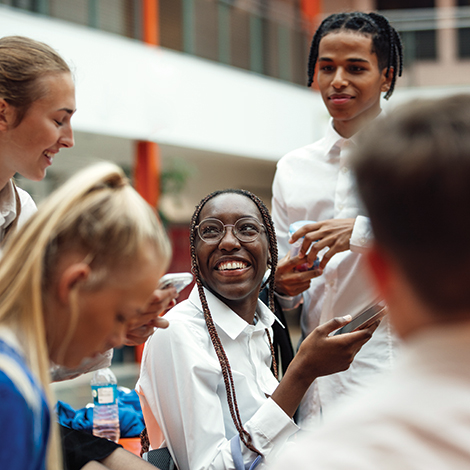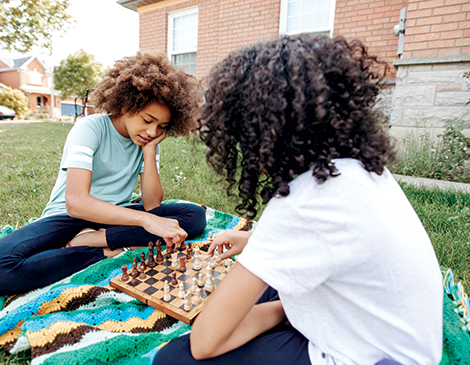Why Quirky Extracurriculars Are Vital to Northeast Ohio Schools
by Vince Guerrieri | Sep. 23, 2023 | 11:00 AM

Courtesy iStock Photos
Ever heard of a lettuce club? It’s a club with a singular goal at its meetings: to see who can eat a head of lettuce the fastest. And Shaker Heights High School has one.
“I feel like a lettuce club is ridiculous, but that’s kind of the point,” says principal Eric Juli.
“If I said every club had to have academic value, I feel like we’d lose a lot of opportunities for students to connect with each other and find out about themselves.” That, he says, is the real value of extracurricular clubs at school: to give students a chance to figure out who they are and find their people, a component of social education as important as the academic education that they get in the classroom. In fact, many schools refer to clubs not as extracurricular, something outside of the school day, but co-curricular, an important complement.

(Photo courtesy iStock Photos)
“I think a lot of people think of clubs as extra, but people come to school needing something different,” Juli says. “I don’t think they’re an add-on. I think they’re a valuable thing because they can get a kid to come to school tomorrow.”
There are always going to be certain clubs in high school. Student council remains a mainstay. There will always be foreign language clubs. But there are some clubs that come and go — a consequence of the transient nature of many schools. A group of students may come to high school interested in starting a club. They’ll take part and graduate and the club can fall dormant. Juli also noted that following the outbreak of COVID-19, which led many schools to go virtual for all or part of the following school year and severely limited non-classroom activities, many clubs had to effectively start again from scratch.
In many school districts, the formation of a school club is limited only by the students’ imagination — and whether or not they can find an advisor. (Juli says the only requirement for the Lettuce Club adviser is that they know the Heimlich maneuver.)
“Students can propose a club at any time,” says Kate Ebert, the director of student life at Magnificat High School in Rocky River. “We have to stay up with the times and engage these students.”
Ebert notes that some clubs rise and fall based on broader pop culture trends. The school’s Adventurer’s Guild Dungeons & Dragons Club was influenced by characters playing the game on Stranger Things, and chess club saw increased interest following The Queen’s Gambit, another Netflix show.
Cameron Cutler, in his seventh year as an adviser for the chess team at John Marshall High School in Cleveland, says The Queen’s Gambit provided a boost in interest there too — as did COVID-19.
“Everyone was home and a lot of people seemed to pick the game up,” he says. “There’s been a huge bump in chess.com membership and the U.S. Chess Federation membership.
“The game’s more accessible than it’s ever been. You used to need a board and someone to play with. Now you can pick up an iPhone and play with someone anywhere in the world.”
That was actually one of the reasons he fell away from the game as a child, Cutler says. He didn’t have anyone to play with. But he had played the game — which made him an ideal candidate when a student was looking for an adviser for the team.

(Photo courtesy iStock Photos)
“I was a new teacher, and I wanted to get involved in something,” Cutler says. “I knew all the rules and some really, really basic strategies, and I think that put me above any other teacher.”
The team started with one regular member. Then two. Now they’re up to 10, and garnering recognition. The team’s played with Cleveland Guardians players (Steven Kwan has made chess a hobby since his time in the minor leagues) and finished in the top 10 at the high school national tournament in April.
With a track record like that, Cutler says some students might be intimidated to join, but he tries to assuage their concerns. At the very least, he says, he would like to see students join some club.
“A lot of students show up at 8 (o’clock) and leave at 3,” he says. “I feel like there are so many things that students don’t take advantage of because they don’t know it exists or they feel intimidated.”
There are some students who leave at 3 p.m. because they have to. They might have to run to an after-school job, or are limited in their transportation options. (Conversely, Juli notes, there are some parents who see the value in after-school activities since they might keep children from being home alone.)
Holy Name High School in Parma started Triple Threat Club Experience Days to reach those kids who might be unable to stay after school. Once a quarter, clubs meet for an hour during the school day, offering students an opportunity to participate. (The name comes from Holy Name’s mission of wanting students to be a triple threat, becoming well-rounded in mind, body and spirit.)
“Kids are excited,” says Kate McCall, the director of communications at Holy Name. “They ask when the next one will be. And the teachers have been very supportive. They see the value in it.”
McCall notes that in some instances, club activities might be as enriching for the teacher as they are for the students. The school’s cooking club adviser is the assistant principal, and a French teacher is the adviser for the craft club.
At Magnificat, the theology teacher advises one of the school’s newest clubs: the criminology club.
“The student who actually had the idea was in my advisory,” Kate Minerd says. “I said, ‘Oh my gosh, I love that idea.’ She said, ‘Good, because I’m looking for a moderator.’”
The club does listen to true crime podcasts. But for its first full year, there are a lot of plans, including a potential murder mystery scavenger hunt in the school, gathering information on potential related careers and even looking at some cold cases in the Cleveland area. “

(Photo courtesy iStock Photos)
“We’re not just looking at crimes,” Minerd says. “We’re looking at social justice.”Clubs aren’t just a high school activity either. Joe Niemantsverdriet, the principal at Harding Middle School in Lakewood, says not only does the school offer a variety of clubs, but many are different from high school activities because middle school students have different interests than those in high school.
Harding has a dodgeball club and last year formed a Shrek Club. “We just had a lot of students who were interested in Shrek,” Niemantsverdriet says. There’s also the Help To Others (known as the H2O) Club, which works in partnership with the city of Lakewood. Students have turned the morning announcements into a news program broadcast on the school’s TV system, sharing updates on lunch, theme weeks, sports and weather. (They’ve even come up with a name for it, the Walk-Home Weather.
“It gives another opportunity for students to connect to the school and community,” says Niemantsverdriet. “It lets kids find their own connections. It’s an opportunity for connection that meets their interests — and they feel a sense of ownership.”
Clubs provide an opportunity for students to get to know each other in a social setting — and sometimes, give them an opportunity to do things they might not have the opportunity to do ever again. Peter Zaremba became a teacher after a successful career as a music performer. He knows being a professional musician might not be an opportunity open to everyone. But as the director of the Normandy High School band, he’s determined to make sure his students not only get the chance to perform in front of an audience but make the most of it.
“It’s a special moment in their lives that won’t happen again, so I try to make it as exciting as I can,” he says. “I don’t want you to just know the notes and where to stand. We practice hard so we can enjoy what we do on the field. Performing is supposed to be fun. We shoot for excellence.”
And even if his students don’t play another note, the exposure to music will yield dividends in the years to come. That’s the value that a lot of students, teachers and administrators see in clubs. They help students figure out the next chapter in their lives, and they learn something along the way.
And they’re usually fun, too.
“I’ve never talked to a kid who joined a club and regretted it,” Cutler says.
Start your day the best way by signing up for our free daily newsletter. Arriving in your inbox every morning to keep you in the loop on the best guides, home and style tips, and news briefs for all things Cleveland. Click here to subscribe.

Vince Guerrieri
Vince Guerrieri is a sportswriter who's gone straight. He's written for Cleveland Magazine since 2014, and his work has also appeared in publications including Popular Mechanics, POLITICO, Smithsonian, CityLab and Defector.
Trending
-
1
-
2
-
3
-
4
-
5










